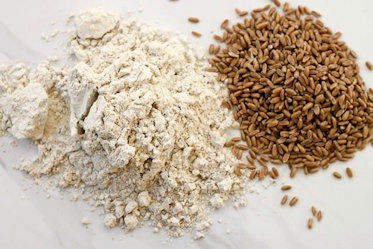|
Spelt, with its mild, nutty flavor, is a popular alternative to wheat. It also provides several essential nutrients, such as iron, magnesium, and zinc. Consuming spelt and other whole grains may improve heart health, aid digestion, reduce the risk of diabetes, and help people achieve or maintain a healthy weight.
Spelt is an ancient grain that's similar to wheat in appearance (and is related, botanically, to wheat). Spelt has a tougher husk, which helps protect the nutrients inside the grain. Flour made from spelt has a nutty, slightly sweet flavour and can be used in most recipes that call for regular or whole-wheat flour. It has nutritional benefits similar to other whole-grain flours: It's a good source of fibre and contains micronutrients such
as calcium and vitamin E.
Not so long ago, if you wanted spelt flour, you had to purchase spelt kernels and use a kitchen grinder to make your own flour. But today, you can buy spelt flour at most grocery stores (check the natural foods or baking section). You can also buy products made with spelt, such as crackers, cookies, pasta, and other snacks and foods.
|
|
All in all, spelt is a healthy whole grain. Eating spelt flour and spelt products is a simple way to get more whole grain fibre into your diet. Spelt grains and flour contain a little more protein than regular wheat, and there's a little difference in the amounts of some of the minerals. They have about the same amount of fibre.
Provides Valuable Fibre
Fibre is essential for a healthy digestive system, and eating fibre-rich foods can slow down the absorption of sugars. Fibre can help you feel full longer, so it may be helpful when eaten as part of a weight-loss diet. One study of thousands of American kids and adults found that those who consumed more whole grains also consumed more nutrients overall, and had a healthier body weight.
Improves Gut Microbiome
The fibre and other compounds in whole grains can contribute to the health of the bacteria in the digestive system. This, in turn, can help reduce inflammation in the body and contribute to digestive health as well as weight loss and management.
Helps Regulate Blood Sugar
Research has shown that people who eat whole grains (vs. refined grains) have a lower risk of diabetes.4 One 2017 study of spelt, in particular, suggested that both the fibre and antioxidants in spelt contribute to this effect.
Decreases Risk of Heart Attack
A diet rich in whole grains has been linked to better cardiovascular health. A Danish study published in 2016 found that people who ate more whole grains had a lower risk of heart attacks.6 The study encompassed more than 50,000 adults ages 50 to 64. Another earlier meta-analysis also showed that higher whole grain consumption was associated with lower risk of heart disease.
|

